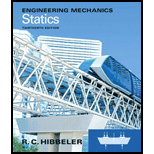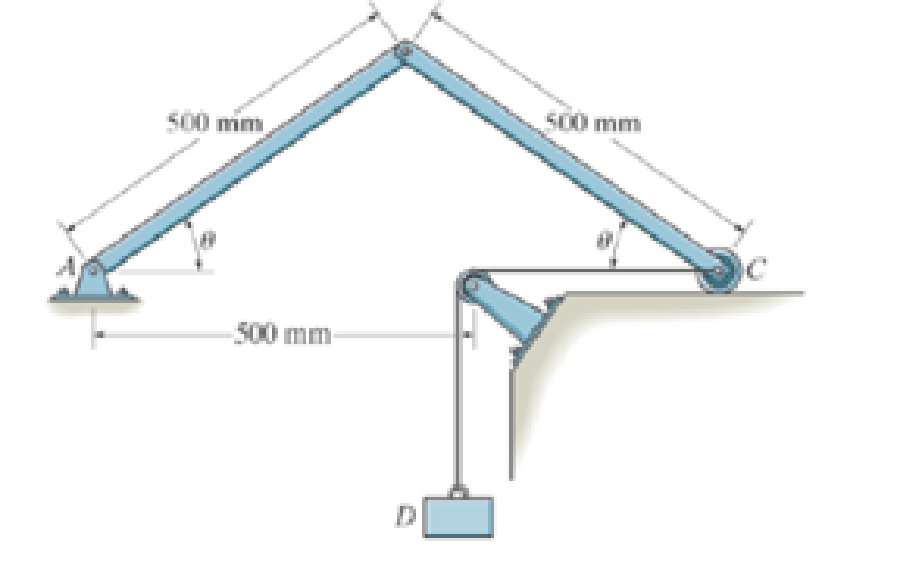
Engineering Mechanics: Statics
13th Edition
ISBN: 9780132915540
Author: Russell C. Hibbeler
Publisher: Prentice Hall
expand_more
expand_more
format_list_bulleted
Concept explainers
Textbook Question
Chapter 11.7, Problem 36P
The bars each have a mass of 3 Kg one the suspended block D has a mass of 7 kg. Cord DC has a total length of 1 m.

Expert Solution & Answer
Want to see the full answer?
Check out a sample textbook solution
Students have asked these similar questions
A mass of ideal gas in a closed piston-cylinder system expands from 427 °C and 16 bar following the process law, pv1.36 = Constant (p times v to the power of 1.36 equals to a constant). For the gas, initial : final
pressure ratio is 4:1 and the initial gas volume is 0.14 m³. The specific heat of the gas at constant pressure, Cp = 0.987 kJ/kg-K and the specific gas constant, R = 0.267 kJ/kg.K.
Determine the change in total internal energy in the gas during the expansion. Enter your numerical answer in the answer box below in KILO JOULES (not in Joules) but do not enter the units. (There is no
expected number of decimal points or significant figures).
my ID# 016948724. Please solve this problem step by step
My ID# 016948724 please find the forces for Fx=0: fy=0: fz=0: please help me to solve this problem step by step
Chapter 11 Solutions
Engineering Mechanics: Statics
Ch. 11.3 - Each link has a mass of 20 kg.Ch. 11.3 - Determine the magnitude of force P required to...Ch. 11.3 - Determine the angle for equilibrium. The spring...Ch. 11.3 - Determine the angle for equilibrium. The spring...Ch. 11.3 - Prob. 5FPCh. 11.3 - Determine the angle for equilibrium. The spring...Ch. 11.3 - Each of the four links has a length L and is pin...Ch. 11.3 - The lamp weighs 10 lb.Ch. 11.3 - Prob. 3PCh. 11.3 - Prob. 4P
Ch. 11.3 - Prob. 5PCh. 11.3 - Prob. 6PCh. 11.3 - It vertical forces P1 = P2 = 30 lb act at C and E...Ch. 11.3 - Prob. 8PCh. 11.3 - if the uniform inks AB and CD each weigh 10 lb....Ch. 11.3 - Prob. 10PCh. 11.3 - Prob. 11PCh. 11.3 - Prob. 12PCh. 11.3 - Prob. 13PCh. 11.3 - Prob. 14PCh. 11.3 - Prob. 15PCh. 11.3 - Prob. 16PCh. 11.3 - Prob. 17PCh. 11.3 - Prob. 18PCh. 11.3 - Prob. 19PCh. 11.3 - The lever is in balance when the load and block...Ch. 11.3 - If the load F weighs 20 lb and the block G weighs...Ch. 11.3 - Determine the force in the hydraulic cylinder...Ch. 11.3 - Determine the horizontal compressive force F...Ch. 11.3 - Prob. 24PCh. 11.3 - Prob. 25PCh. 11.7 - Prob. 26PCh. 11.7 - If the potential function for a conservative...Ch. 11.7 - Prob. 28PCh. 11.7 - Determine the equilibrium positions and...Ch. 11.7 - Prob. 30PCh. 11.7 - Prob. 31PCh. 11.7 - Determine the angle for equilibrium when a weight...Ch. 11.7 - Prob. 33PCh. 11.7 - Prob. 34PCh. 11.7 - Prob. 35PCh. 11.7 - The bars each have a mass of 3 Kg one the...Ch. 11.7 - Prob. 37PCh. 11.7 - Prob. 38PCh. 11.7 - Prob. 39PCh. 11.7 - It is unstretched when the rod assembly is in the...Ch. 11.7 - Prob. 41PCh. 11.7 - Determine the weight W2, that is on the pan in...Ch. 11.7 - Prob. 43PCh. 11.7 - Determine the steepest grade along which it can...Ch. 11.7 - Prob. 45PCh. 11.7 - Prob. 46PCh. 11.7 - Point C is coincident with B when OA is...Ch. 11.7 - If the block has three equal sides of length d,...Ch. 11.7 - Prob. 49PCh. 11.7 - Prob. 50RPCh. 11.7 - Prob. 51RPCh. 11.7 - Prob. 52RPCh. 11.7 - Prob. 53RPCh. 11.7 - Prob. 54RPCh. 11.7 - Prob. 55RPCh. 11.7 - Prob. 56RPCh. 11.7 - Prob. 57RPCh. 11.7 - Prob. 58RPCh. 11.7 - If both spring DE and BC are unstretched when =...Ch. 11.7 - Prob. 60RPCh. 11.7 - Prob. 61RPCh. 11.7 - Determine the horizontal force P required to hold...
Knowledge Booster
Learn more about
Need a deep-dive on the concept behind this application? Look no further. Learn more about this topic, mechanical-engineering and related others by exploring similar questions and additional content below.Similar questions
- My ID# 016948724 please solve the proble step by step find the forces fx=o: fy=0; fz=0; and find shear moment and the bending moment diagran please draw the diagram for the shear and bending momentarrow_forwardMy ID#016948724. Please help me to find the moment of inertia lx ly are a please show to solve step by stepsarrow_forwardplease solve this problem step by steparrow_forward
- Please do not use any AI tools to solve this question. I need a fully manual, step-by-step solution with clear explanations, as if it were done by a human tutor. No AI-generated responses, please.arrow_forwardPlease do not use any AI tools to solve this question. I need a fully manual, step-by-step solution with clear explanations, as if it were done by a human tutor. No AI-generated responses, please.arrow_forwardPlease do not use any AI tools to solve this question. I need a fully manual, step-by-step solution with clear explanations, as if it were done by a human tutor. No AI-generated responses, please.arrow_forward
- [Q2]: The cost information supplied by the cost accountant is as follows:Sales 20,00 units, $ 10 per unitCalculate the (a/ newsale guantity and (b) new selling price to earn the sameVariable cost $ 6 per unit, Fixed Cost $ 30,000, Profit $ 50,000profit ifi) Variable cost increases by $ 2 per unitil) Fixed cost increase by $ 10,000Ili) Variable cost increase by $ 1 per unit and fixed cost reduces by $ 10,000arrow_forwardcan you please help me perform Visual Inspection and Fractography of the attatched image: Preliminary examination to identify the fracture origin, suspected fatigue striation, and corrosion evidences.arrow_forwardcan you please help[ me conduct Causal Analysis (FTA) on the scenario attatched: FTA diagram which is a fault tree analysis diagram will be used to gain an overview of the entire path of failure from root cause to the top event (i.e., the swing’s detachment) and to identify interactions between misuse, material decay and inspection errors.arrow_forward
arrow_back_ios
SEE MORE QUESTIONS
arrow_forward_ios
Recommended textbooks for you
 International Edition---engineering Mechanics: St...Mechanical EngineeringISBN:9781305501607Author:Andrew Pytel And Jaan KiusalaasPublisher:CENGAGE L
International Edition---engineering Mechanics: St...Mechanical EngineeringISBN:9781305501607Author:Andrew Pytel And Jaan KiusalaasPublisher:CENGAGE L

International Edition---engineering Mechanics: St...
Mechanical Engineering
ISBN:9781305501607
Author:Andrew Pytel And Jaan Kiusalaas
Publisher:CENGAGE L
Ch 2 - 2.2.2 Forced Undamped Oscillation; Author: Benjamin Drew;https://www.youtube.com/watch?v=6Tb7Rx-bCWE;License: Standard youtube license